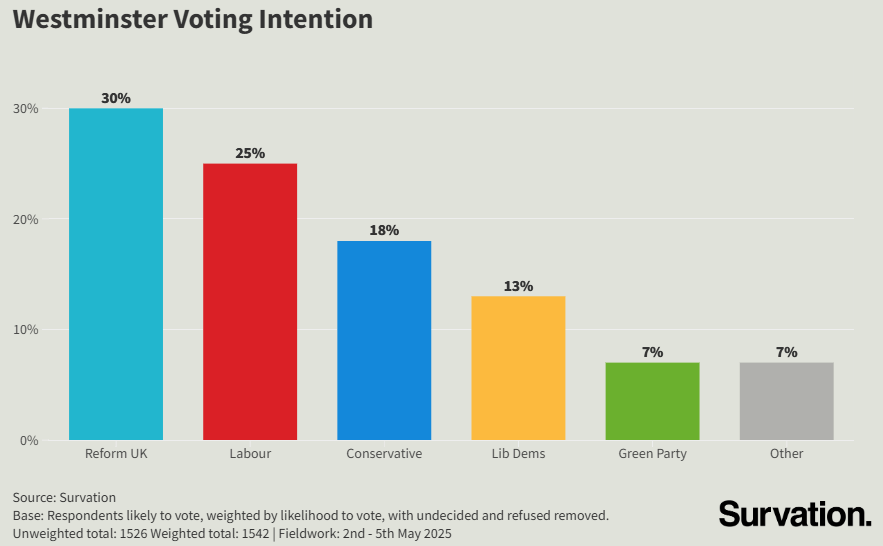
Reform Surges to First: The Two-Party System Cracks
The latest voting intention polling from Survation puts Reform in first place, with 30% of the intended vote share, up 4 points from our previous poll. Labour is down 1 point to 25% and the Conservatives have reached a low of 18%, down 4 points. This poll was conducted in the aftermath of the local elections, with Reform’s bump possibly a reflection of the increased media attention surrounding their recent electoral successes.
Labour and the Conservatives have continued to decline, now polling at 43% combined. Reform’s 30% is the highest intended vote share recorded so far by Survation research, demonstrating voters newfound tendency to move away from the traditional parties in favour of challengers. The implications of this unprecedented challenge to the two-party system are discussed below.
Disproportionality and unpredictability are on the rise, with recent elections proving that we are living through the death throes of our archaic electoral system
The results of the local elections and Runcorn and Helsby by-election should not have been surprising. Only last year, we witnessed the least representative general election in British political history. Most were too dumbstruck by the largest Commons majority since Blair to seriously consider the implications of this, with the local elections merely continuing this trend, seeing Reform gain 41% of the seats on a 31% vote share. Voters clearly now exhibit a hitherto unknown willingness to break away from the status quo and try something new, but our atavistic electoral system misrepresents their votes – cementing disproportionality and unpredictability.
The previous record for disproportionality, the difference between the percentage of votes a party receives and their percentage of parliamentary seats, was held by the 1983 general election, but things are much worse than what the change in the Gallagher index (the commonly used measure for disproportionality) would suggest: 2024 also recorded the second lowest voter turnout since universal suffrage in 1928. British citizens, seemingly, are increasingly disincentivised to engage with electoral politics given the knowledge that their ballot will not be of equal value to others’ – something that has traditionally fuelled the need to vote tactically, if at all. Despite this, voters are increasingly opting for alternatives.
Developments during and since 2024 only make increased disproportionality and unpredictability more likely. Recent Survation polling shows Labour and the Conservatives on barely 40% combined, with Reform overtaking Labour as the biggest party nationally on 30%. What’s more, Runcorn demonstrated that Reform are breaking through in areas they have not ordinarily enjoyed support, with a bump following the local elections also putting them second place in Scottish Westminster voting intention polling. At the same time, independent candidates (over twice as many of which stood in 2024 than in 2019) are surely emboldened by notable victories and near-wins. With the rise of Reform at the expense of the two major parties – taking 16% of Labour’s 2024 voters and 26% of the Conservative’s – and the increasing presence of independent and minor party candidates, if the next general election were held today it would likely surpass 2024’s disproportional precedent. The reason: our electoral system does not accommodate such shifts.
Even if these votes for Reform, independent, or minor party candidates do not translate into Westminster seats, they will certainly be enough to generate greater unpredictability. Come the next general election, we could find hundreds of candidates wrecking the odds in local constituencies up and down the United Kingdom – replicating Ralph Nader’s famous upset of Al Gore in Florida twenty-five years ago. With increasing marginality, the power of Nader’s spiritual progeny increases exponentially. Runcorn and Helsby’s six vote victory for Reform was merely the first flap of the butterfly wing. Seats that have returned one party for over a hundred years may suddenly find the balance tip in favour of challengers – it’s squeaky-bum time for the likes of Wes Streeting and Jess Phillips.
A solution to this problem is electoral reform. And yet, neither Labour nor the Conservatives are proposing it. Most egregiously of all, no politician – with the possible exceptions of Jeremy Corbyn and Nigel Farage (who is, albeit for selfish reasons, a proponent of electoral reform) – has given people something to vote for, rather than against, in an entire generation. Under such conditions, there is little chance that insurgent electoral forces can be halted or that growing apathy and disenchantment can be stymied.
The rise of disproportionality and unpredictability is clearly a multi-faceted phenomenon, driven by numerous under-discussed trends. Nonetheless, the salient fact is that First Past the Post is bursting at the seams. Whatever the result of the next general election, if electoral reform is not on the table, we will be locked into a downward spiral of misrepresentation and volatility; for those who hold office at the end of it – whether Labour, Conservative, or Reform – it can only be a Pyrrhic victory. If they do not take heed of recent electoral trends, we will become a democracy in name only.
—
GET THE DATA.
Survation conducted an online poll of 2,032 adults aged 18+ in the UK on their voting intentions on behalf of True North Advisors. Fieldwork was conducted between 2nd – 5th May 2025. Tables are available here.
________________________________________
Survation. is an MRS company partner, a member of the British Polling Council and abides by their rules. To find out more about Survation’s services, and how you can conduct a telephone or online poll for your research needs, please visit our services page.
If you are interested in commissioning research or to learn more about Survation’s research capabilities, please contact John Gibb on 020 3818 9661, email researchteam@survation.com, or visit our services page.
For press enquiries, please call 0203 818 9661 or email media@survation.com
< Back

